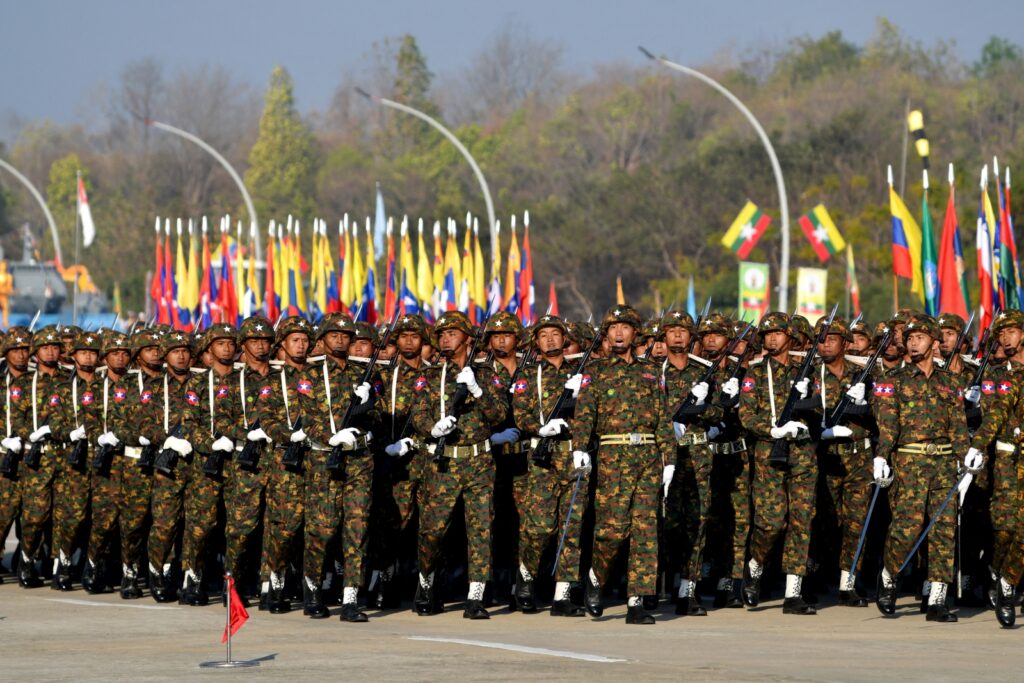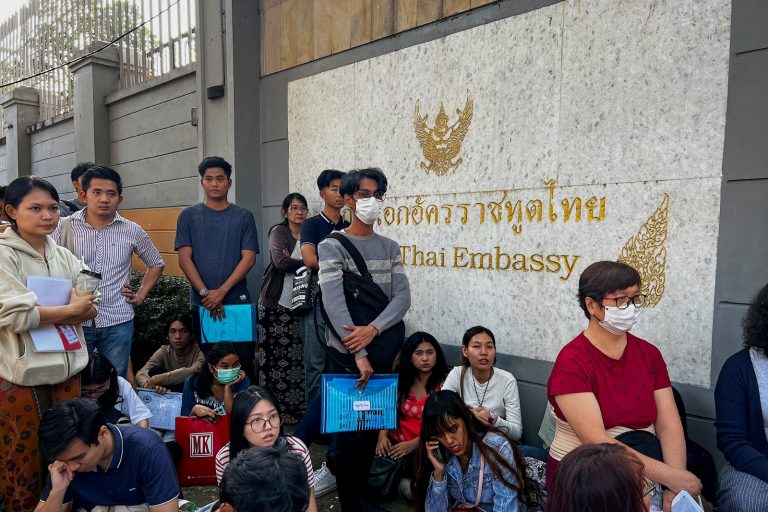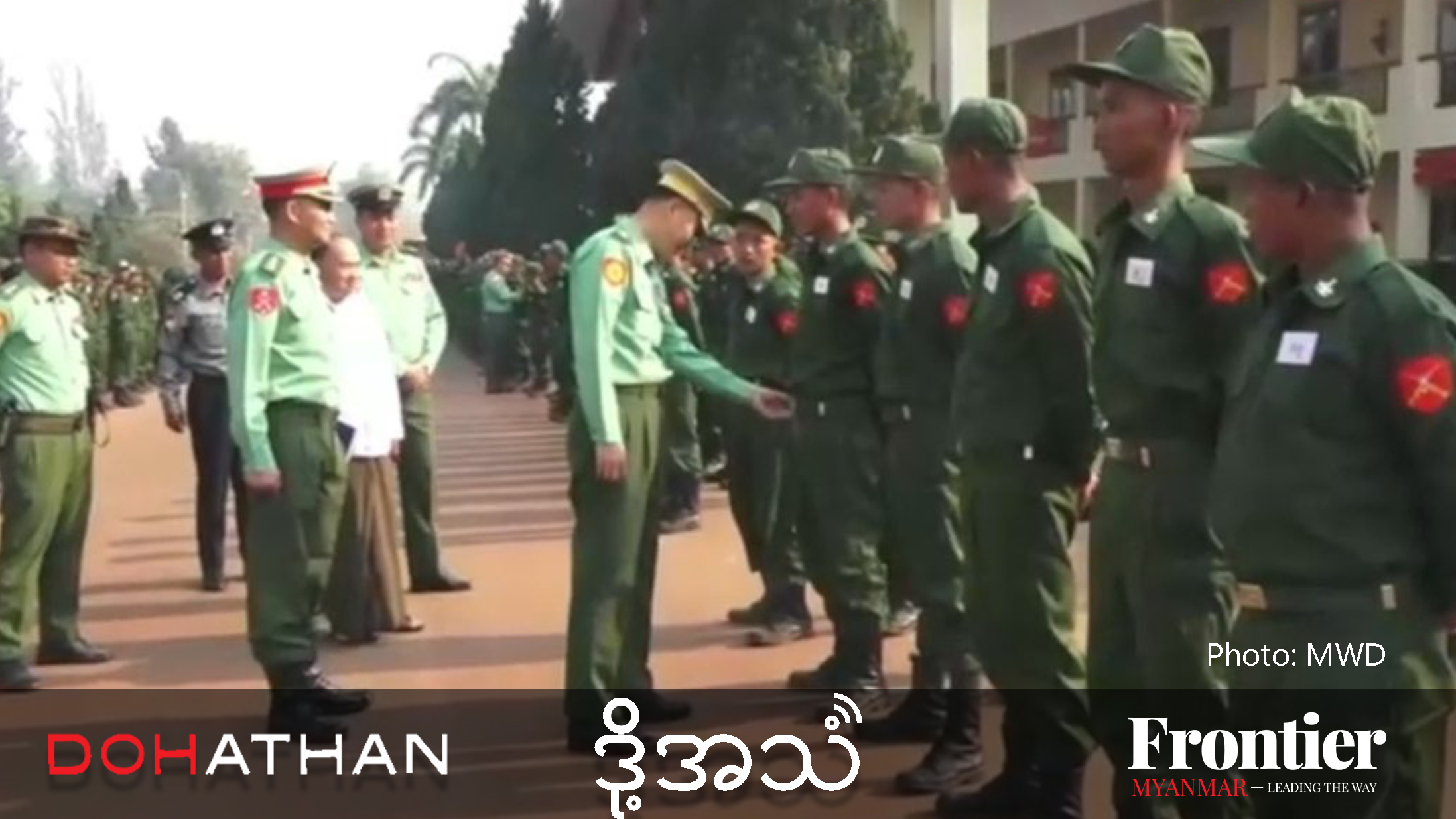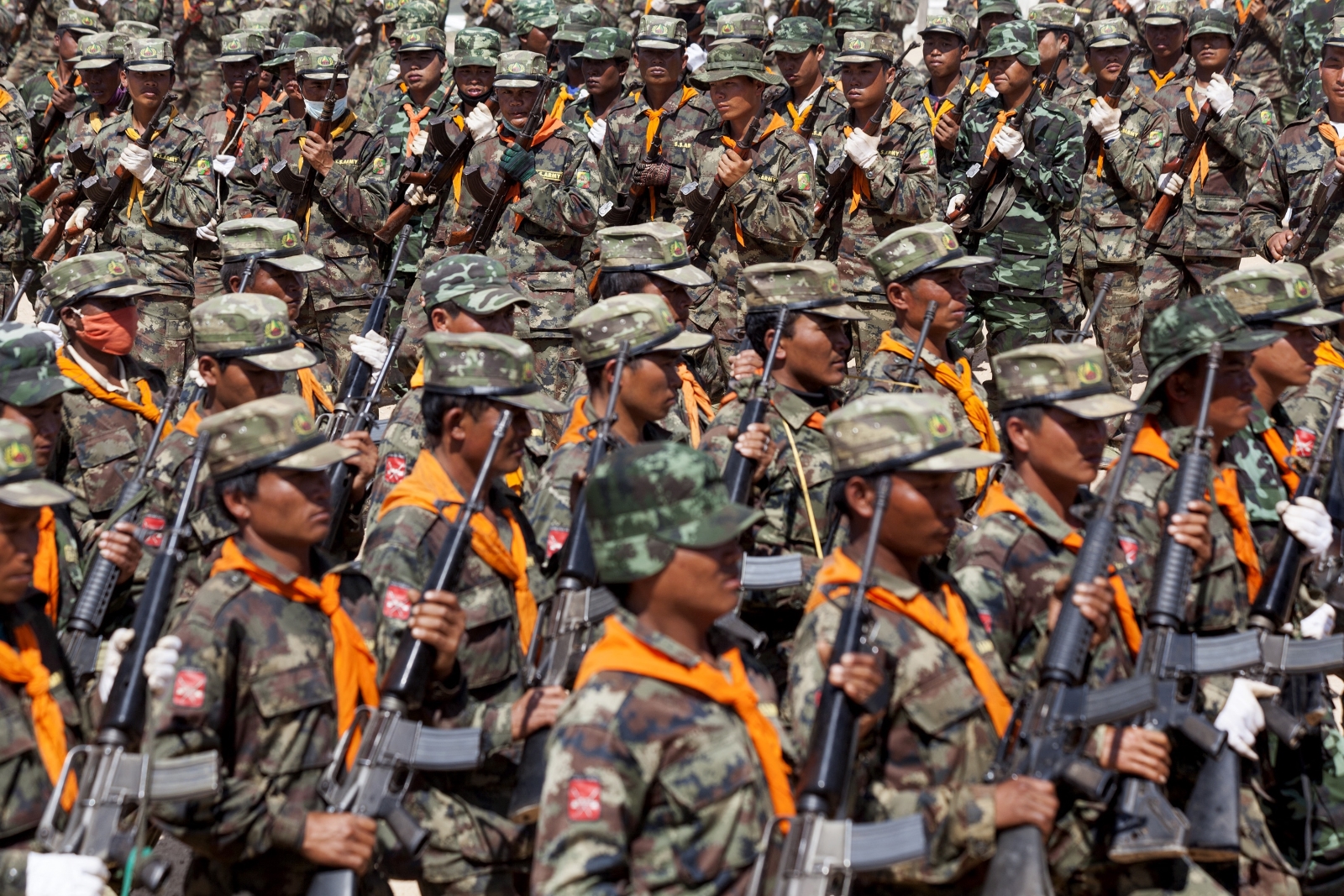Young people and their families are seeking any way they can to evade the Myanmar military’s conscription drive – sometimes with the help of sympathetic local administrators.
By NAW BETTY HAN | FRONTIER
Junta-appointed local administrators have held meetings throughout Myanmar to pick future conscripts, usually in lottery draws, since the regime announced it would enforce an old military service law on February 10.
But in a ward administration office in the Mon State capital of Mawlamyine, residents were called to an unusual meeting in the second week of March – to find ways to avoid the draft.
“We can’t accept young people from our ward being forced to become soldiers. We need to think of how to avoid this. I can’t allow my son to become a soldier,” U Myint Kyaw*, a resident with a 23-year-old son, told Frontier.
According to the law, enacted by the last junta in 2010, every Myanmar man aged 18-35 and woman aged 18-27 may be called to serve in the military for two years. This can be extended to five years during a national emergency, which the regime declared on the day of the coup in 2021 and has kept extending. There are 14 million people eligible for recruitment, but few are keen to serve the widely despised military.
The junta’s conscription drive is so unpopular that some of the regime’s administrators are against it – but they feel there is little they can do.
“If possible, I don’t want to send anyone to the military,” said U Soe Aung*, the 54-year-old ward administrator who convened the meeting in Mawlamyine.
Soe Aung was the administrator before the February 2021 coup. He submitted a resignation letter in March that year, but has been unable to quit because a replacement has yet to be found.
He has two sons, aged 21 and 24, eligible for military service. He told Frontier he doesn’t want to force his sons to participate in a lottery to choose the conscripts, but he doesn’t want to give them special privileges. So, he convened the meeting to look for other options.
“On the orders of the junta, we have compiled a list of young people eligible for military service,” Soe Aung explained at the meeting, a recording of which was shared with Frontier. “There are more than 500 houses in our neighbourhood, 458 of which have at least one person of service age. Of those, four will have to serve.”
“Will your sons be on the list? Don’t do it unfairly,” said one resident, a woman with two sons eligible for the draft.
U Soe Kyaw*, a junior ward official, suggested that families simply send their children abroad if they don’t want them to be drafted. “I’ll write recommendation letters for whoever wants to leave so they can travel easily. If someone is on the list of potential conscripts but he is not in the country, I think he’ll be safe.”
But Myint Kyaw objected, saying this would shift the burden to families like his to supply recruits. “I cannot afford to send my sons abroad. We need to think about poor families like mine,” he said.
Then Soe Kyaw asked for volunteers instead, but nobody raised a hand. “In that case, it’s just a matter of counting everyone and drawing lots,” he said with a sigh.
Myint Kyaw then had a different idea, to incentivise volunteers with cash.
“Each household with a potential recruit can donate 10,000 kyats [US$2.6 at the market rate]. Then we pool the cash and give it to the four people who will serve in the military,” he suggested. According to his plan, each conscripted soldier would get over K1 million.
Soe Kyaw and most of the residents accepted the idea and there was a call for volunteers. Seven young men raised their hands, and a lot was drawn to pick four of them.
Later asked by Soe Kyaw why they had put themselves forward, the seven said they just wanted to support their impoverished families.

Money for nothing
When the overstretched junta announced its conscription plan in February, it said it would recruit 5,000 men per month, while exempting women for the time being. Those who refuse to serve in the military can be sentenced to up to five years in prison.
Most local administrators seem unable or unwilling to defy the regime’s orders, leading to several of them being assassinated by armed resistance groups.
Despite widespread opposition to the draft, regime-controlled media announced that training for the first batch of conscripts began on April 8 in multiple locations across Myanmar, claiming the recruits had all “voluntarily enlisted”. Meanwhile, there have been reports of local administrators preparing for a second batch since as early as March 30.
Other administrators have sought similar workarounds as Soe Kyaw in Mawlamyine, seeking funds from communities to entice volunteers. However, some families say their payments have been in vain.
In March, a village tract administrator in Bago Region’s Yedashe Township told households that if they didn’t want their children to be conscripted, they each had to pay K50,000 so he could hire recruits from elsewhere.
“We gave K50,000 to the administrator so our son wouldn’t serve in the military,” said Daw Wah Wah*, a 62-year grocery shop owner with one child of eligible age.
Nonetheless, she said her son and young people from the 100 other local households were subsequently included in a conscription lottery on March 20.
“I asked if they were going to pay the money back, and they said they would do so later,” she told Frontier.
Although her boy’s name wasn’t picked in the initial lottery, he could be less lucky in future draws. Moreover, one of the young men chosen on March 20 had been in Japan for a long time and officials will likely be looking for a replacement.
“I don’t know who will replace him. We have run out of money and are also worried about our kid,” she said.
A youth exodus
With few reliable workarounds, many young people have concluded it’s too risky to stay where they are.
As previously covered by Frontier, the conscription drive has led to an unexpected form of reverse migration. Youth who had fled post-coup fighting in regions such as Sagaing to more stable areas like Yangon are now fleeing back to their home villages. While many of these villages remain war zones, armed resistance groups have largely evicted local administrators working for the junta, making conscription unworkable.
Other youth have sought refuge with resistance groups based far from their homelands. One of them is 28-year-old Ko Min Khant*, a doctor from Shwepyithar Township in the commercial capital Yangon. After the coup he quit his job at a government hospital and joined the Civil Disobedience Movement against the regime.
“I opened a [private] clinic in my ward, but when the junta announced it would enforce the conscription law, I thought that the revolutionary forces would help me,” he told Frontier.
Three days after the draft announcement, Min Khant fled to an area controlled by the Karen National Union on the border with Thailand. He now works at a clinic there.
“I had to inform my parents and say goodbye. They were worried and sad but didn’t stop me, because they don’t want to see their kid become a soldier and die,” he said.
The KNU, which has fought for autonomy for the Karen people for decades, had announced that it would shelter young people who do not want to serve in the military.
“We always welcome with open arms young people who come to the revolutionary forces,” the group’s spokesperson Padoh Saw Taw Nee told Frontier.“It would be beneficial if everyone could fight together to overthrow the military council.”
People’s Embrace, an organisation helping regime soldiers to defect, says that over 18,000 youth have contacted them seeking help since the conscription law was activated.
“We are helping young people who contact us by giving them information and putting them in touch with revolutionary forces,” Captain Lin Htet Aung of PE told Frontier. “We have helped connect over 10,000 people with resistance groups. For the rest, some contacted us first and then said they would get back to us, and others changed their minds and went abroad.”
“Regardless, we’re always ready to help young people who don’t want to serve in the military,” he said.
Meanwhile, thousands of others have opted to leave the country. They include 23-year-old Ko Htet Wai* from Yangon’s Thingangyun Township, whose parents mortgaged their house to raise the money to send him to Thailand.
When the summons to report for military service at the ward office arrived at his Yangon home, Htet Wai had already left. But he told Frontier that he fears for his mother and father.
“If young people who are supposed to serve in the military are not at home, their parents might be punished.”
*indicates the use of a pseudonym for security reasons







